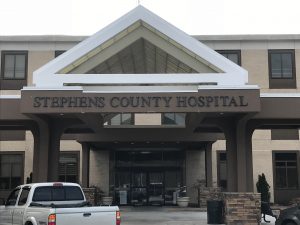Rural Healthcare Bill Passes State House, Now Moves to Senate
Wednesday was Crossover Day under the Gold Dome in Atlanta, and one of the House bills the Senate is now considering is designed to improve rural health care.
State Representative Dan Gasaway said all of HB769 is a product of research by the Rural Development Council.
Last year, the Council held meetings across the state, including in Toccoa, and came up with a list of recommendations.
HB769 includes several health care provisions based on those recommendations.
 One important part of the bill would establish the Rural Center for Health Care Innovation and Sustainability, which Gasaway says is designed to help train hospital authority boards and administrators in smaller, rural hospitals.
One important part of the bill would establish the Rural Center for Health Care Innovation and Sustainability, which Gasaway says is designed to help train hospital authority boards and administrators in smaller, rural hospitals.
“What the Center is trying to do is to provide best practices curriculum and provide training for using that curriculum for rural providers,” Gasaway said. “But the big thing it includes, and this includes Northeast Georgia, it provides required training for hospital authority board members with penalties if it’s not adhered to; and in addition, training for hospital executive leadership.”
Gasaway said the need for training came as the result of issues with hospitals in Habersham, Franklin, and Barrow counties where counties ended up footing the bill for bond issues the hospitals could not afford to pay back.
“In Habersham County, their hospital authority went out in the early 2000’s and borrowed right at $40-million for a hospital renovation,” he explained. “Well, nobody on that hospital authority had any remote knowledge whatsoever of what they were doing, to put it bluntly. They were being led by a private company that was contracted to run the hospital. And that has turned into the biggest hospital disaster decision in Georgia right now. And the County is having to subsidize the hospital and will for the foreseeable future. Or, if they are fortunate enough to sell the hospital, the taxpayers of Habersham County are going to have to absorb at least $30-million of that money.”
right at $40-million for a hospital renovation,” he explained. “Well, nobody on that hospital authority had any remote knowledge whatsoever of what they were doing, to put it bluntly. They were being led by a private company that was contracted to run the hospital. And that has turned into the biggest hospital disaster decision in Georgia right now. And the County is having to subsidize the hospital and will for the foreseeable future. Or, if they are fortunate enough to sell the hospital, the taxpayers of Habersham County are going to have to absorb at least $30-million of that money.”
The same thing happened in Franklin County when Ty Cobb Regional Medical Center officials announced they could no longer make the $660,000 bond payments and the facility was sold to St. Mary’s Healthcare system for $12-million dollars, leaving the County responsible for paying back a $30-million dollar bond debt.
That’s why Gasaway says the mandatory training in HB769 is so important for board members and administrators.
“It happened in Franklin, it happened in Barrow and Habersham, and it’s going to happen in Stephens,” Gasaway noted. “So, this is a place to provide real training for hospital authority board members. A lot of these boards are the same people who have have been on these authorities forever and they don’t realize that the hospital system they’re working in doesn’t work anymore financially because of everything that has changed. And they don’t know what to do even if they do realize it. But the hope is we will get some resources to better equip these board members more rapidly, create an environment for them to network with other hospital boards, and try to get some stability in this collapsing system.”
In addition, if passed HB769 would also allow for the creation of micro-hospitals.
Those would be smaller hospitals for remote parts of rural counties with two-to-seven inpatient beds and provide 24/7 emergency services.
Under the bill, micro-hospitals would not be required to obtain a new certificate of need if purchased by a bigger hospital in a neighboring county.
Finally, the bill would create a grant program within the Georgia Board of Physician Workforce to provide financial assistance for some rural physicians who establish or operate a practice in an underserved area of the state.
Lawmakers hope the bill’s wide-ranging health care provisions would allow the rural hospital sector to thrive in rural Georgia.
